What You Missed: February 2, 2025
This Week: Egypt, The Netherlands, Rwanda, Denmark, and Thailand
Key Themes: Geopolitical Conflict, Regional Stability, Colonial Legacies, National Identity, and The Role of Media
What You Missed Ledger: Circa. January 2025
1️⃣ ‘Egypt Fears Syria’s Revolutionary Fervor Could Be Contagious’ - https://www.nytimes.com/2025/01/31/world/middleeast/egypt-syria.html
Egypt contends with the possibility of an uptick in revolutionary sentiment following the collapse of the Assad regime in Syria. President Abdel Fattah el-Sisi watches warily as public sentiment turns against his dictatorship. Revolutionary fervor, especially in the modern Middle East and North Africa, spreads like wildfire. This was most apparent after the start of the Arab Spring in 2010 when the Egyptian revolution overthrew longtime President Hosni Mubarak and installed an electoral system. The nation's first elections saw an Islamist party win the power struggle, only to be quickly overthrown by el-Sisi in a military coup.
Islamism has been a focal point of contention for el-Sisi and other like-minded leaders seeking to suppress its rise regionally. Following al-Assad’s withdrawal from Syria, Syrians residing in Egypt have faced increased turmoil. Up to 50 people were arrested during celebrations of al-Assad’s regime collapse, and border crossings now require security clearances for Syrians. El-Sisi has sought to draw a stark contrast between himself and al-Assad, portraying himself as a largely benevolent leader. However, this narrative fails to reflect Egypt’s troubled record, including a 2013 massacre, tens of thousands of political prisoners, and multiple human rights violations.
Egypt is primed for protest, as harsh economic conditions have plagued the nation in recent years. Ahmed al-Mansour, an Egyptian who joined the Syrian revolutionary cause, posted a video on X stating that el-Sisi was "worth a bullet." This led to mass outrage in Egyptian media and government-backed sources, calling for the new Syrian government to respond. Al-Mansour was arrested in mid-January while en route to a meeting with Syria’s interim defense minister. His anti-Sisi movement has pleaded for his release, citing his exercise of free speech, similar to those who spoke out against al-Assad. However, his current status remains unknown.
Egypt’s economy has suffered from government mismanagement, ambitious yet unrealistic megaprojects, and additional strain from the wars in Ukraine and Gaza. The standard of living has worsened for the country's 110 million citizens, with over a third currently living in poverty. El-Sisi has cited Egypt's previous economic struggles before he took office, but his promises of a grander, more prosperous future now seem like a pipe dream. Initially seen as a savior for ousting the Muslim Brotherhood in 2011, his popularity has steadily declined since his coup.
Islamists have remained a constant adversary of el-Sisi, and suppressing them is a key tenet of his rule. When Hayat Tahrir al-Sham, the former al-Qaeda-affiliated Islamist rebel group, took control in Syria, the Egyptian government went on high alert. While al-Sham has disavowed its previous extremist rhetoric, it has yet to engage in formal diplomatic meetings with Egypt. The Egyptian government, though no ally of al-Assad, saw his rule as a stabilizing force, in contrast to the conflict-ridden neighboring states of Libya, Sudan, and Gaza.
Egypt has discussed the new Syrian government with other regional powers, urging them to be wary of it and prevent Syria from becoming a haven for terrorists and criminals. Anti-Islamist sentiment runs strong in Egypt, as does opposition to el-Sisi. How will Egypt establish diplomatic relations with the new Syrian government, and what role will Syria play in the broader MENA region?
2️⃣ ‘Suspects named after theft of golden objects from Netherlands museum’ - https://www.theartnewspaper.com/2025/01/30/three-arrested-theft-ancient-golden-objects-netherlands-museum
The Netherlands has arrested suspects in a grand art theft case following an explosive crime scene. Last Saturday, multiple objects on loan from the Romanian National History Museum, including the Helmet of Coțofenești, were stolen from the Drents Museum. Douglas Chesley Wendersteyt Bernhard Zeeman and an undisclosed woman, all from Heerhugowaard, have been identified as the top suspects in the crime. This follows the police’s discovery of a bag in neighboring Assen, which led them to the suspects.
The incident has caused international tension between the Netherlands and Romania, as the stolen items are not only worth millions but also hold deep cultural significance for Romanian heritage. The loaned collection focused on the Dacian civilization, an ancient empire that spanned Central Europe and covered much of modern-day Transylvania. Ernest Oberlander-Tarnoveanu, the Romanian museum director responsible for the loan, has been removed from his position. Romanian Foreign Affairs Minister Emil Hurezeanu has emphasized the cultural importance of the stolen items, while Romanian citizens and press have questioned the security measures in place at the Dutch museum.
Although Dutch police have swiftly identified the suspects, the Helmet of Coțofenești and three gold bracelets remain missing. The crime was carried out after the thieves blew open a side door to the museum, then smashed the display cases with a hammer. In their hasty retreat, they discarded the hammer in a nearby ditch, leaving no fingerprints behind.
The Drents Museum issued a statement praising investigators for their swift action, calling the arrests a step toward reconciliation with all involved, particularly the Romanian people. The stolen objects, estimated at $6 million in value and considered priceless to Romania, have been compared in cultural importance to Rembrandt’s The Night Watch for the Dutch. The Dacian civilization left no known written texts, making historical artifacts like these the only surviving records of their culture.
Arthur Brand, an art detective known for recently securing the return of a stolen Van Gogh, believes the objects were stolen for their material rather than historical value. He explained that the artifacts would be nearly impossible to sell but that their high gold content alone would make them an attractive target for criminals. Brand estimates that Dutch police have a “50-50” chance of recovering the objects.
What can Dutch investigators do to most efficiently search for the missing artifacts? And how will the Dutch government respond to Romania if the items remain lost?
3️⃣ ‘Another major war is looming – and western support for Rwanda is fuelling it’ - https://www.theguardian.com/commentisfree/2025/jan/31/war-west-support-rwanda-m23-rebels-drc
Rwanda is all but confirmed to be backing the M23 rebels as they advance further into the Democratic Republic of the Congo’s (DRC) western territory, escalating fears of a major regional conflict. Early this week, M23 forces stormed Goma, the capital of North Kivu Province, marking a significant escalation in the ongoing crisis. In response, Congolese citizens have called for Western support, blaming international complacency for the conflict’s persistence. Millions have been displaced and are in urgent need of humanitarian aid, while protesters in Kinshasa have stormed the Rwandan, French, and American embassies.
UN Secretary-General António Guterres has urged Rwanda to halt all support for M23, labeling the unfolding events a humanitarian disaster. Rwandan President Paul Kagame has been a longtime ally of Western powers and a major recipient of foreign aid. Rising to power following the 1994 Rwandan genocide, Kagame has framed his support for militant groups like M23 as a necessary measure to protect the Tutsi population, citing ongoing pogroms and ethnic persecution in eastern DRC.
The conflict between Rwanda and the DRC has persisted for over three decades, fueled by ethnic tensions and competition over valuable mineral resources. A 2002 peace deal, facilitated by the largest UN peacekeeping force in history, failed to maintain stability, as rebellions erupted in 2004, 2008, and 2012—when Goma was briefly seized. Rwanda has faced little Western criticism, often regarded as a post-genocide success story due to its efficient use of foreign aid. Even after the UK, US, and EU suspended funding over Rwanda’s alleged support for M23, foreign aid still constitutes approximately one-third of Rwanda’s national budget.
DRC President Félix Tshisekedi initially sought to improve relations with Rwanda following his 2019 election victory. However, his efforts may have come too late, as M23 had been quietly rebuilding and rearming in the country’s east. Tensions escalated in 2021 after negotiations over M23’s integration into Congolese civil society collapsed. Despite renewed conflict, Rwanda has continued to receive increased Western support—from a controversial deportation deal with the UK to troop deployments in Mozambique to fight jihadist insurgencies, as well as lucrative mineral supply agreements.
US Secretary of State Marco Rubio has called for Kagame to withdraw from the DRC, but Rwanda’s relationships with Turkey and Qatar provide alternative revenue streams, reducing its reliance on Western backing. In its fight against M23, the DRC has sought support from South African and Tanzanian forces, as well as Eastern European mercenaries. Western governments fear that Russia could further expand its influence in the region by offering military assistance to the desperate Congolese government, mirroring the Wagner Group’s operations in Africa’s Sahel region.
The fall of Goma could ignite a larger regional war, dragging Central Africa into widespread conflict. Which nations are best positioned to respond to this growing crisis, and which are most vulnerable to its consequences?
4️⃣ ‘Greenland and Denmark: How past scandals weigh on relations’ - https://www.dw.com/en/greenland-denmark-relations-scandals/a-71448548
Denmark faces mounting pressure from American President Donald Trump over its territory of Greenland, just as the island itself grapples with growing calls for independence. Trump has renewed discussions about American annexation of Greenland, bringing to light long-standing tensions between Denmark and its former colony. Simultaneously, historical scandals involving Danish policies toward Greenland’s Inuit population have resurfaced, fueling further discontent.
A recent Danish radio investigation unearthed the IUD scandal of the 1960s and 1970s—a government-backed program of mass birth control that primarily targeted Greenlandic women, many of whom were minors. The policy, which was effectively a form of population control, forced thousands of Inuit women to undergo compulsory contraception, often without their knowledge or consent. The Danish government justified the program as a way to reduce the number of children born out of wedlock and to slow Greenland’s population growth. However, critics argue it amounted to state-mandated ethnic suppression. Today, many of the women who suffered from the policy are suing the Danish government for medical malpractice and trauma, demanding an official apology.
Another scandal from the 1950s has also re-entered public discourse: the forced relocation of 22 Greenlandic children to Denmark under the guise of modernization. Six of these children were orphaned and adopted, while half died in early adulthood due to psychological distress. None of them ever returned home. To many Greenlanders, these past policies reflect not only arrogance but a deliberate attempt to erase their cultural identity. Rather than integrating the Inuit people into the Danish nation, Denmark sought to assimilate them into Danish culture—often at the expense of their heritage.
Denmark, for its part, has long defended its historical and cultural ties to Greenland. The Danish government has consistently argued to the United Nations that Greenland remains an essential part of the Danish Crown, despite the island’s increasing financial and political autonomy. However, many Greenlanders view their current relationship with Denmark as an evolved form of colonial rule, as the island remains heavily dependent on Danish subsidies.
Trump has sought to exploit this division as a potential pathway to American annexation, even suggesting Greenland could become the 51st U.S. state. While he first floated the idea of purchasing Greenland in 2019, his rhetoric has intensified, citing strategic military positioning and resource extraction as primary incentives. Greenland’s Prime Minister, Múte Bourup Egede, a staunch advocate for independence, has repeatedly rejected any American offers. However, Trump’s renewed interest has reignited debates over Greenland’s future—both on the island and in Copenhagen.
Will Trump successfully pressure Denmark into relinquishing Greenland? Will Denmark hold firm in retaining its Arctic territory? Or will this renewed attention ultimately accelerate Greenland’s path to full independence?
5️⃣ ‘Moo Deng, the Toddler Hippopotamus, Is Still a Star’ - https://www.nytimes.com/2025/02/01/world/asia/moo-deng-thailand-zoo.html
Thailand is experiencing a tourism boom thanks to an unlikely star—Moo Deng, a young pygmy hippopotamus affectionately known as Bouncy Pork. Moo Deng has become the most famous living creature in Thailand, captivating both locals and international visitors. Her immense popularity has transformed the Khao Kheow Open Zoo into a must-visit destination, drawing hundreds of thousands of visitors eager to catch a glimpse of the beloved hippo.
However, fame comes at a cost. Moo Deng has at times been overwhelmed by the attention, occasionally subjected to lighthearted but unwelcome antics—such as water splashes or banana peel tosses—which send her scampering away with a shriek. Despite this, she remains the heart of the zoo, with massive investments pouring in for new hippopotamus structures, themed merchandise, and even a dedicated song in her honor.
Narongwit Chodchoy, the director of Khao Kheow Open Zoo, attributes Moo Deng’s success to her role as a much-needed distraction from Thailand’s political turbulence. Born just a month after the ousting of a Thai Prime Minister over ethics violations, Moo Deng provided a rare escape from the daily grind of politics and social unrest. Her presence at the zoo has tripled monthly visitors to an astounding 200,000.
Moo Deng’s fame even extended to international politics. During the November 2024 U.S. presidential election, she was enlisted to predict the winner by selecting from two food dishes. She chose Donald Trump. Narongwit, a self-professed admirer of Trump’s economic policies and leadership style, denied any interference in Moo Deng’s decision, though the moment quickly went viral.
The global pygmy hippo population remains critically low, with only an estimated 2,500 left in the wild, primarily in West Africa. Other pygmy hippos, such as Poppy in Virginia and Haggis in Scotland, have also gained media attention, though Narongwit remains ambivalent about their rise in popularity. Notably, Poppy is Moo Deng’s half-sister.
The hippo phenomenon in Thailand has extended beyond Moo Deng—her brother, Moo Toon, recently wed Moo Manao in a ceremony presided over by the King’s sister and blessed by Buddhist monks. While the event delighted many, it also reignited debate over the ethics of captive breeding programs. Animal rights organizations argue that such programs often fail to support conservation efforts meaningfully, with many zoos—Khao Kheow Open Zoo included—still operating outdated enclosures.
As Moo Deng continues to enchant Thailand and beyond, her story raises an intriguing question: will other zoos and cities attempt to replicate her success, using social media and star animals to boost tourism? While there is undeniable potential, the pursuit of viral fame must be handled with care to avoid the exploitation of animals for entertainment. Could the rise of "celebrity animals" lead to greater awareness and conservation efforts, or will it result in more harm than good?
Photo Credits:
President Abdel Fattah el-Sisi of Egypt commemorating Police Day last week in a photograph released by the Egyptian presidency. [The Egyptian Presidency, The New York Times]
The Helmet of Coțofeneşti (around 450 BC) was among the objects stolen in the heist. [Ing. Marius Amarie, Drents Museum]
M23 rebels escort captured government soldiers and police in Goma, the Democratic Republic of the Congo, 30 January 2025. [Moses Sawasawa, AP]
Henriette Berthelsen was just 13 years old when she was forced to have an IUD coil inserted in her womb by Danish authorities. [Gunnar Köhne, DW]
Moo Deng napping in a corner of her enclosure. [Lauren DeCicca, The New York Times]

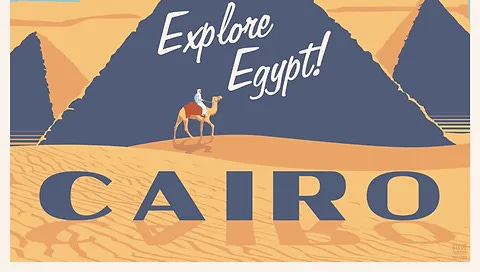



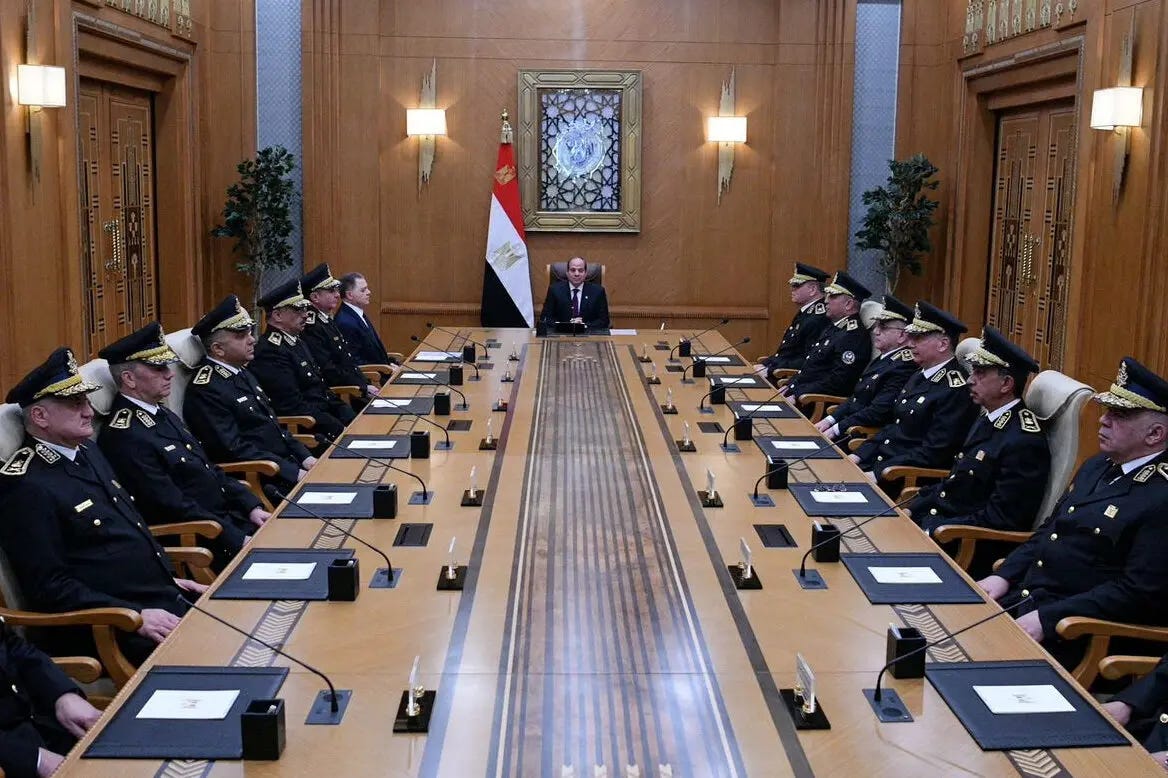
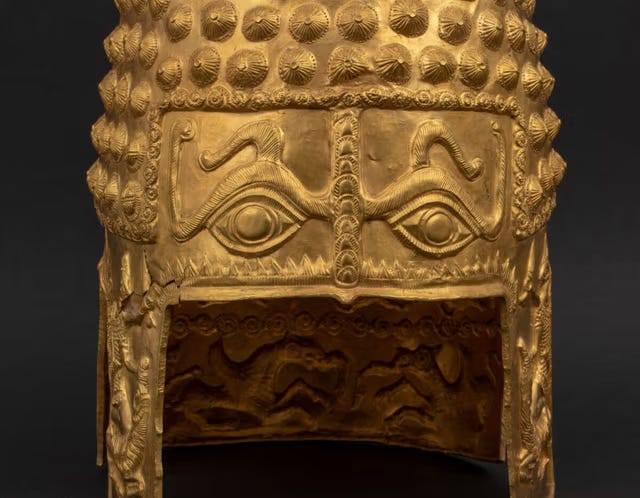
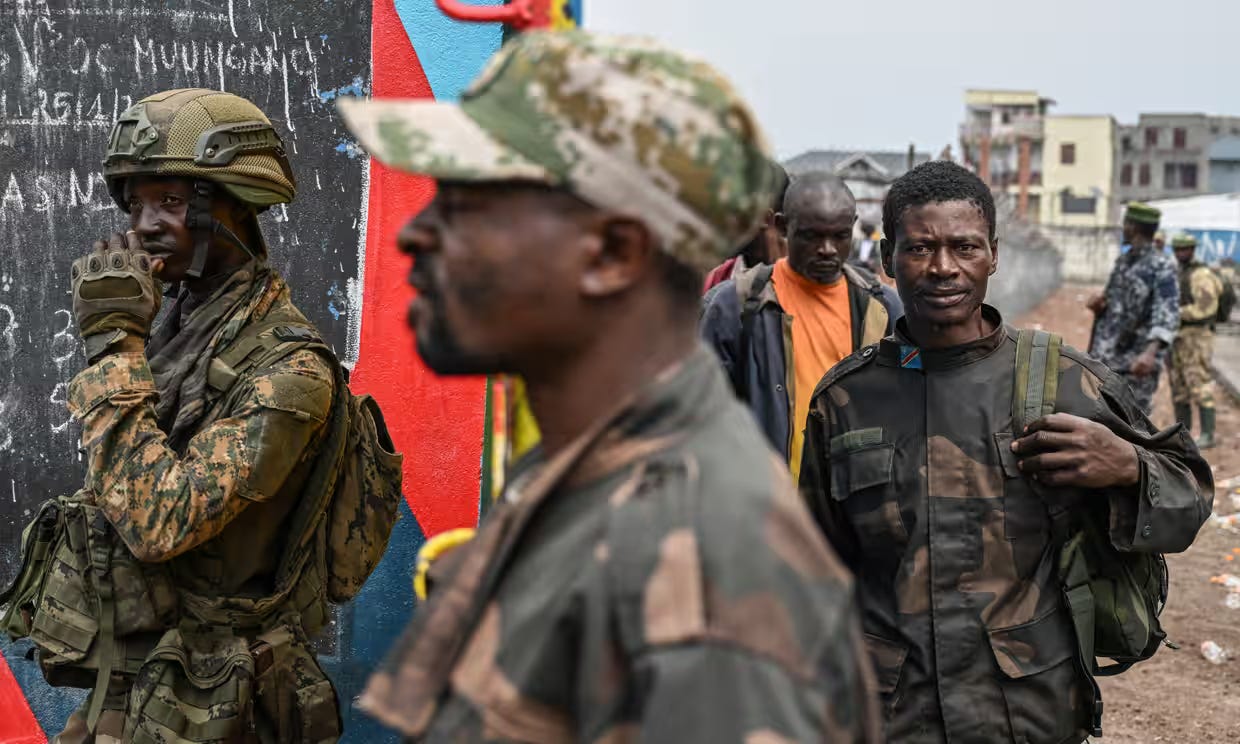
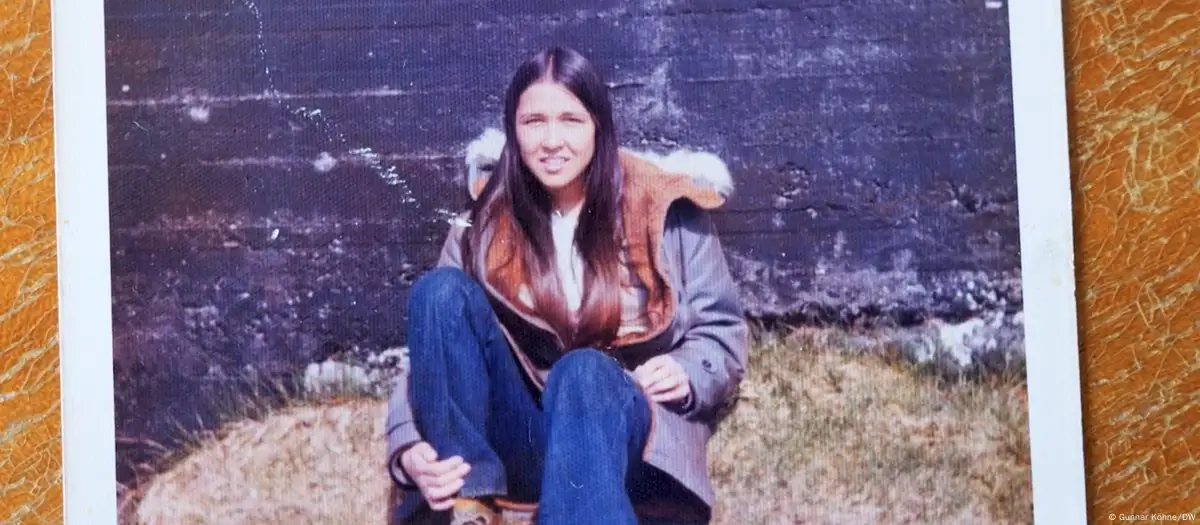
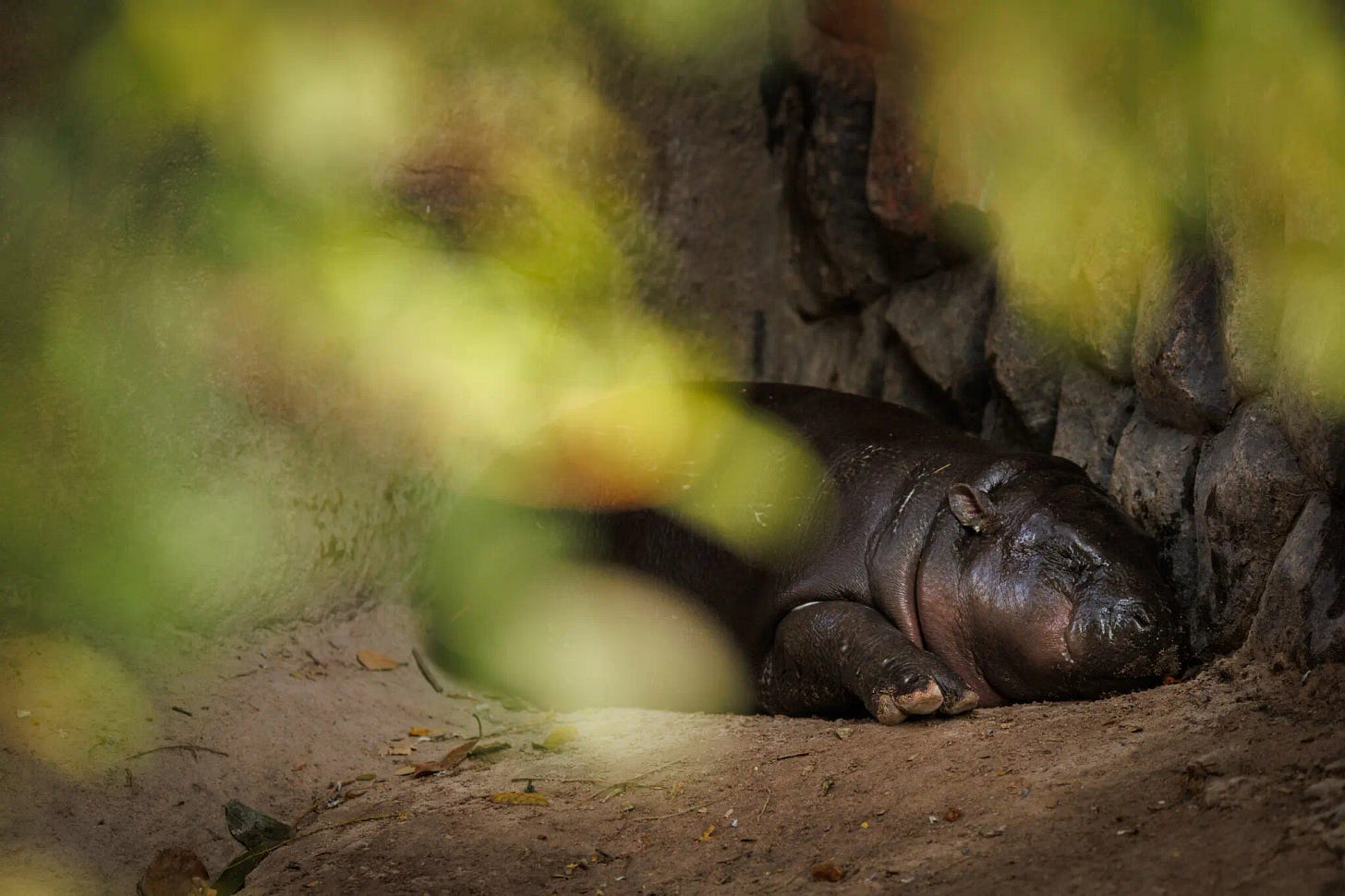
Interesting issue, especially about Greenland.